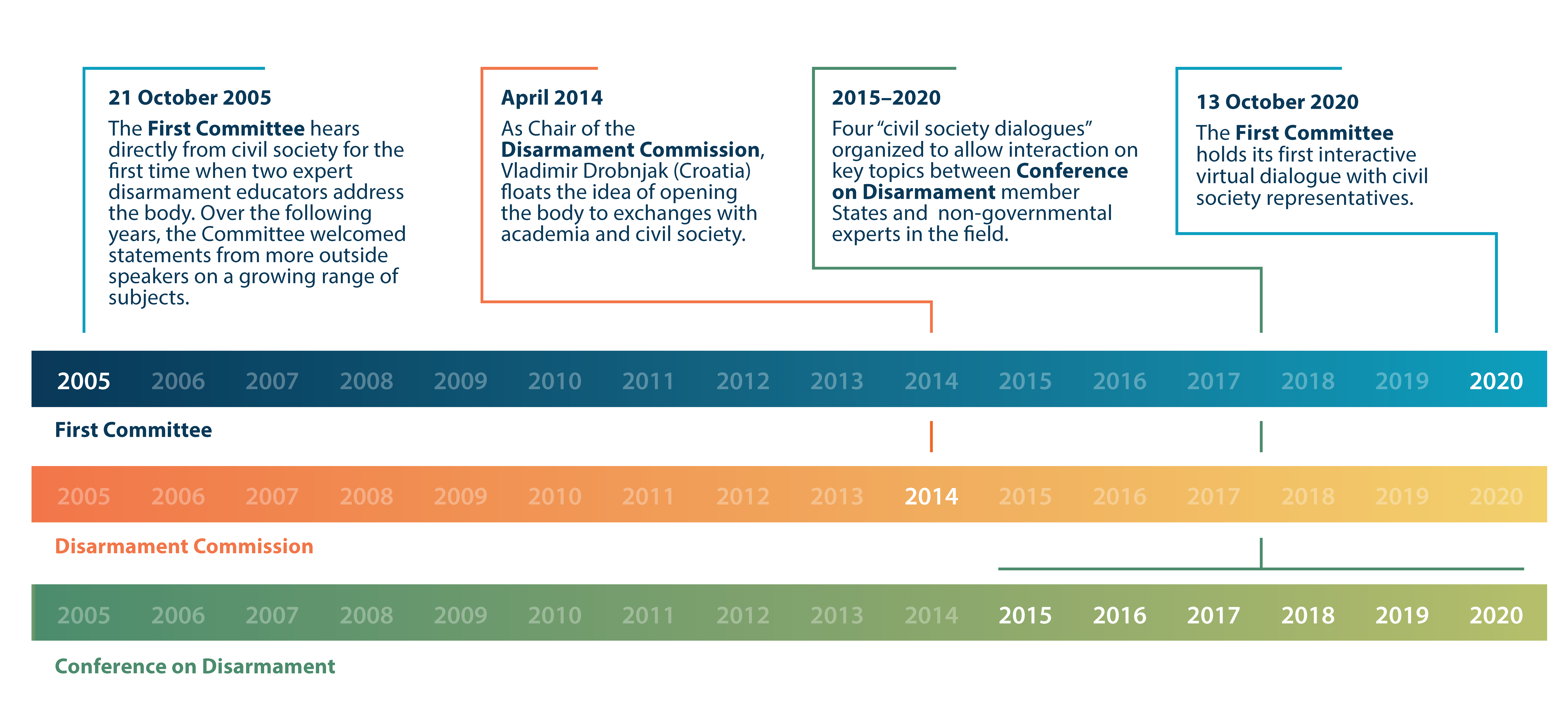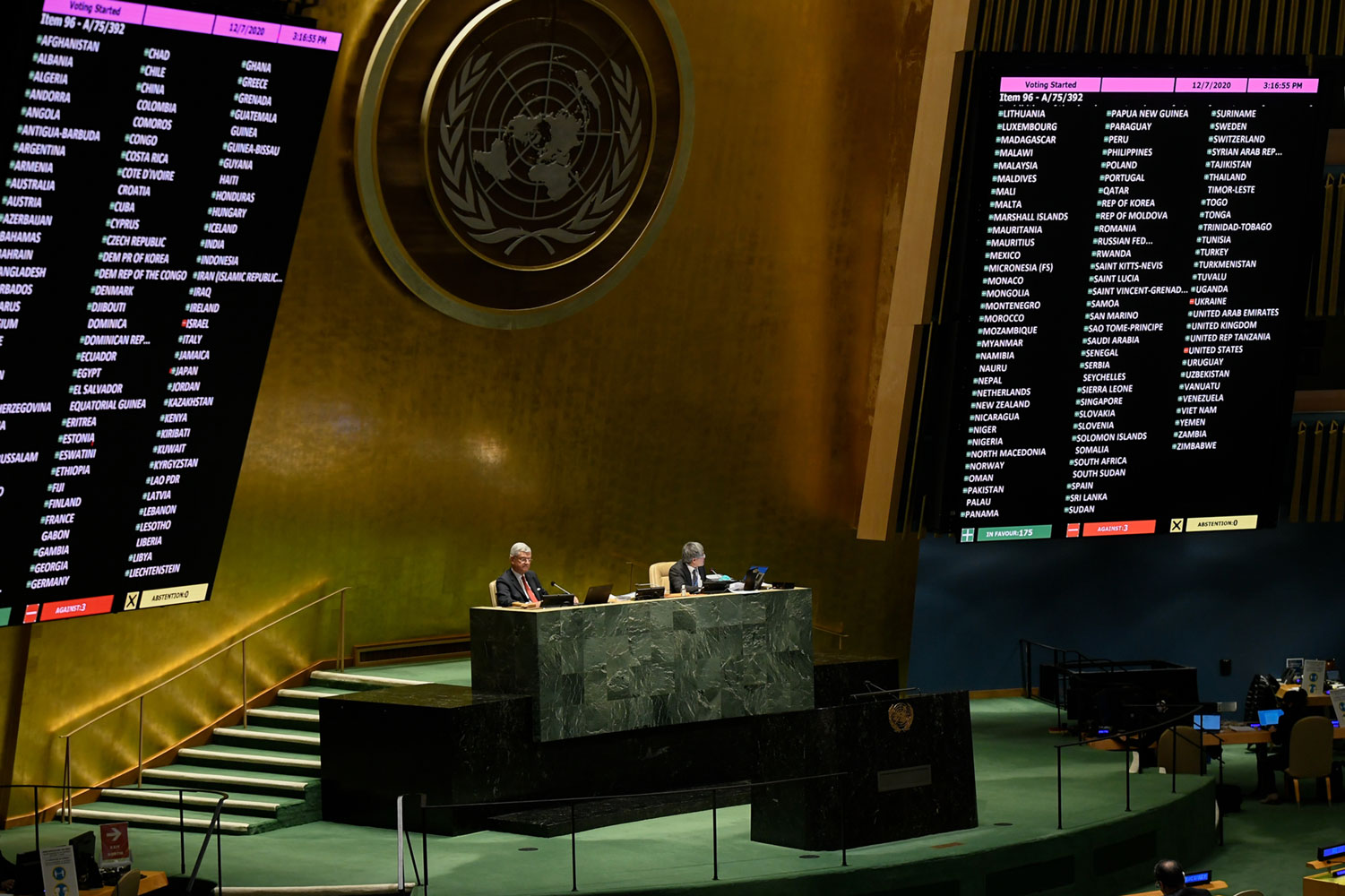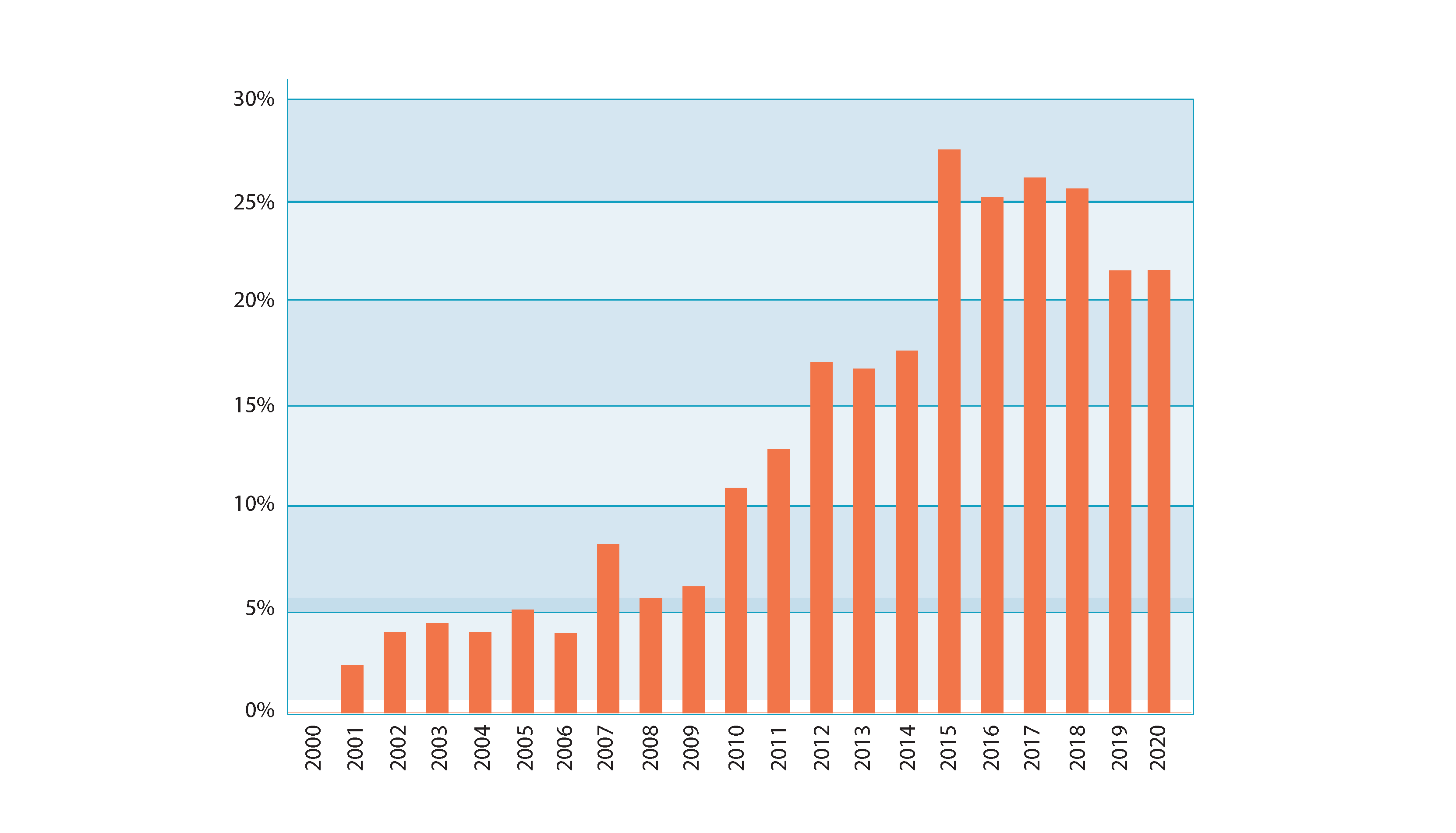The Conference on Disarmament was established to serve as the premier international negotiating body for solving hard questions of arms and security. … It is only natural that [the Conference] should be at the forefront of the strategic dialogue our world needs to secure our common future.
The COVID-19 pandemic severely affected the functioning of the multilateral disarmament machinery in 2020. Shortly after the United Nations Headquarters was temporarily closed in March, the General Assembly postponed the annual session of the United Nations Disarmament Commission, which had been scheduled for April. Although the Headquarters in New York was reopened to a limited number of delegates and staff over the following months, substantial restrictions on in-person participation remained in place, including a full suspension of access by stakeholders from civil society and the public. Similar restrictions at the United Nations Office at Geneva prompted the Conference on Disarmament to suspend and subsequently limit its work.

Disarmament, non-proliferation and arms control are not the work of government officials alone. In a complex, fast-changing international security landscape, the advice of independent advocates and experts—like physicians, lawyers and technologists—is essential to helping States craft meaningful policies to pursue peace.
Recognizing that, the General Assembly’s First Committee heard directly from civil society speakers for the first time in 2005. Since then, the body has devoted a regular part of its annual session to hearing independent voices on issues related to disarmament and international security. Smaller steps have been taken to encourage the integration of experts, industry and non-governmental organizations into the proceedings of the two other primary disarmament organs, the Conference on Disarmament and the United Nations Disarmament Commission.
In his Agenda for Disarmament, the Secretary-General committed in 2018 to working with States to further enhance civil society access and participation in United Nations disarmament forums.
Despite the difficulties caused by the pandemic, the First Committee of the General Assembly fulfilled its mandate by approving 71 draft resolutions and decisions that, inter alia, ensured the continuity of its work and established new mandates on outer space and information and communications technologies. The body held its seventy-fifth session in an abridged format, having revised its programme of work and timetable to expand the general debate of its substantive session without holding a thematic debate. In place of its usual thematic debate, the Committee held informal virtual meetings for interactive thematic discussions. It also allowed Member States to submit, in writing, statements for the general debate and the thematic discussions, as well as statements to exercise their right of reply and explain their votes. In total, the Committee held 15 formal, in-person meetings from 8 October to 10 November.

The General Assembly hears reports of the First Committee and adopts resolutions and decisions on disarmament, non-proliferation and arms control on 7 December 2020.
UN Photo/Evan Schneider
However, the Committee carried out its work in the shadow of a worsening global security environment. As in past years, its deliberations were marked by heightened tensions among major powers, in particular concerning nuclear weapons, the investigation of alleged chemical-weapon use, and processes for addressing issues on outer space and information and communications technologies.
In the Committee’s deliberations on nuclear weapons, geopolitical rivalries surfaced during intense exchanges on, inter alia, the following: calls by the United States and its allies for China to participate in future arms control discussions; the inclusion of non-strategic nuclear weapons in such discussions; and a proposal by the Russian Federation for a moratorium on the deployment of intermediate- range missiles in Europe. In addition, deep divisions on the issue of nuclear disarmament persisted between nuclear-armed States and non-nuclear-weapon States, with the latter expressing grave concern both about the lack of progress and nuclear modernization programmes that were tantamount to a qualitative arms race between States possessing nuclear weapons. Discussions on the Treaty on the Prohibition of Nuclear Weapons also remained contentious; as States possessing nuclear weapons and many of their allies reiterated their strong opposition to the Treaty, others welcomed the conditions for its entry into force being met during the Committee’s 2020 session.
As in recent years, the Committee witnessed bitter exchanges on the possession and use of chemical weapons in the Syrian Arab Republic. Despite the universal expression of serious concern about the current challenge to the global norm against chemical weapons, Member States continued to present divergent views on how to investigate and attribute responsibility for the use of such weapons. Furthermore, condemnations of the use of the chemical agent Novichok in the attempted assassination of Alexei Navalny, a citizen of the Russian Federation, further intensified the Committee’s rancorous deliberations in that area.
Despite heightened concerns about biosafety and bioterrorism against the backdrop of the pandemic, the First Committee did not approve a draft resolution submitted by the Russian Federation calling for an update of the Secretary- General’s Mechanism for Investigation of Alleged Use of Chemical and Biological Weapons. In that connection, many States expressed concern about the proposal to transfer responsibility for relevant investigations to the Security Council, suggesting that that would undermine the right of any State to bring an allegation to the attention of the Secretary-General.
The pandemic also affected the deliberations of the First Committee on issues related to conventional weapons. In two important procedural decisions on the illicit trade in small arms and light weapons, the Committee postponed the seventh Biennial Meeting of States to Consider the Implementation of the Programme of Action to Prevent, Combat and Eradicate the Illicit Trade in Small Arms and Light Weapons and rolled over, to 2021, the mandate of the Group of Governmental Experts on Problems Arising from the Accumulation of Conventional Ammunition Stockpiles in Surplus. The pandemic also prompted many Member States to reflect on the world’s surging military spending—estimated at almost $2 trillion in 2020—and call for its reduction and diversion towards socioeconomic development, including effective responses to COVID-19. The Committee also heard growing expressions of support for the Arms Trade Treaty, with States welcoming progress made in its implementation, despite the pandemic.
Preventing unnecessary suffering in armed conflict has been a goal of international law for nearly two centuries. In recent decades, many countries have been pushing to rein in specific means and methods of warfare based on their indiscriminate or disproportionate effects—particularly on civilians. Focusing their efforts on the humanitarian impact of certain weapons, those States progressively achieved the entry into force of treaties against anti-personnel landmines, cluster munitions and nuclear weapons.
During that same period, countries began referring to humanitarian principles in a growing number of General Assembly resolutions related to disarmament. Such references may reflect a growing understanding of “humanitarian disarmament” as an effective complement to approaches that pursue disarmament through measures such as strengthening confidence, trust and stability among States.
On outer space issues, the First Committee’s deliberations reflected an increased sense of urgency in pursuing new measures considering technological developments and the rapidly expanding use of outer space. That urgency continued to be affected by persistent divisions among major powers, including on the initiation of negotiations on a legal instrument with a focus on the placement of weapons in outer space. In light of those dynamics, the Committee voted on all five draft resolutions on outer space, including a new, draft resolution sponsored by the United Kingdom entitled “Reducing space threats through norms, rules and principles of responsible behaviours”.
Regarding information and communications technologies, First Committee delegates expressed concern about an increase in malicious activity with the onset of the pandemic. The Committee also responded to the COVID-19 pandemic with the adoption, by consensus, of two procedural decisions to postpone the meetings of the two relevant ongoing processes: the Group of Governmental Experts on Advancing Responsible State Behaviour in Cyberspace in the Context of International Security; and the Open-ended Working Group on Developments in the Field of Information and Telecommunications in the Context of International Security. In addition, based on a proposal by the Russian Federation, the Committee adopted a draft resolution to establish a new open-ended working group for five years starting in 2021.
Meanwhile, the Conference on Disarmament overcame a significant disruption by the pandemic, convening 25 formal meetings and 4 informal plenary meetings in 2020. However, the Conference again could not reach a consensus on a programme of work, despite concerted efforts and intense consultations led by the six presidents of its 2020 session, Algeria, Argentina, Australia, Austria, Bangladesh and Belarus.
Separately, the United Nations Disarmament Commission held two informal meetings in February to prepare for its substantive sessions. Unable to reach an agreement on several organizational matters, the Commission decided to postpone its organizational meeting to a date on or before 6 April, when its substantive session was expected to begin. Shortly after the pandemic was declared, however, the General Assembly decided to postpone the Commission’s upcoming substantive session to 2021.
The Advisory Board on Disarmament Matters held two sessions in 2020, as scheduled, beginning a two-year programme of work to reflect on alternative approaches and a potential new vision for nuclear disarmament and arms control. Meeting in Geneva in January and virtually in June, the Board discussed possible new approaches to revitalizing and modernizing the disarmament architecture and machinery, particularly in the context of an international security landscape characterized by growing political and technological complexity.
The General Assembly decided in 1976 to convene its first special session devoted to disarmament (SSOD), noting “that the continuation of the arms race endangers international peace and security and also diverts vast resources urgently needed for economic and social development”. It ultimately held three such sessions, in 1978, 1982 and 1988.
At the first session (SSOD-I), the General Assembly adopted, by consensus, a historic final document. That report contained a landmark declaration and a programme of action that laid down fundamental principles and priorities for disarmament, notably establishing general and complete disarmament as the ultimate objective and effective measures of nuclear disarmament as the highest priority. SSOD-I also created the so-called “disarmament machinery”.*
The second session, held in 1982, produced little substantive outcome beyond reaffirming the purposes and principles of SSOD-I and launching the World Disarmament Campaign. Despite the improved international environment, the third session, held in 1988, concluded without substantive agreement. However, those special sessions provided a unique opportunity for all Member States to discuss wide-ranging disarmament issues comprehensively, and they remain the most important forum for pursuing general and complete disarmament.
The General Assembly has called for an SSOD-IV since 1994 and established four Open-ended Working Groups to consider its objective and agenda, holding substantive sessions in 2003, 2006, 2007 and from 2016 to 2017. At its last substantive session, the Opened-ended Working Group made progress towards convening SSOD-IV by agreeing on recommendations for its objectives and agenda.
* The General Assembly created a disarmament machinery of three primary organs by (a) establishing the forerunner to the Conference on Disarmament as the “single multilateral disarmament negotiating forum”; (b) limiting the agenda of its First Committee to disarmament and international security matters; and (c) re-establishing the United Nations Disarmament Commission as a permanent subsidiary body to engage in relevant deliberations. SSOD-I also created the Programme of Fellowships on Disarmament, established the United Nations Institute for Disarmament Research and what is now the Advisory Board on Disarmament Matters and called for a Disarmament Week, starting on 24 October each year, to encourage relevant awareness-raising initiatives.